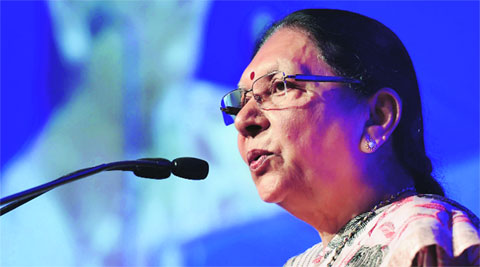Among the controversial provisions of the Bill is Clause 16 which makes confessions before police officers admissible in court.
The Gujarat Assembly, on Tuesday, passed the Gujarat Control of Terrorism and Organised Crime Bill 2015, a re-adopted version of the controversial 2003 Gujarat Control of Organised Crime Bill (GUJCOCA), which had not received the presidential nod.
The State government said the legislation was aimed at tackling terrorist activities and organised crime. However, the Opposition Congress staged a walk out opposing the new Bill, saying its provisions were contradictory to the national criminal law.
Some of the key features of the Bill:
1. Among the controversial provisions of the Bill is Clause 16 which makes confessions before police officers admissible in court. The section stipulates that “a confession made by a person before a police officer not below the rank of Superintendent of Police…shall be admissible in the trial of such accused, co-accused, abettor or conspirator.”
2. The Bill also provides for extension of the period of investigation from the stipulated 90 days to 180 days.
3. It makes offences under the Gujarat Control of Terrorism and Organised Crime Act, 2015, non-bailable. Clause 20 (4) of the Bill states, “Notwithstanding anything contained in the Code of Criminal Procedure, no person accused of an offence punishable under this Act shall, if in custody, be released on bail or on his own bond.”
4. The Bill also makes “evidence collected through the interception of wire, electronic or oral communication” admissible in the court.
5. It provides immunity to the State government from legal action through an ambiguous idea of “good faith.” Section 25 of the Bill states, “No suit, prosecution or other legal proceeding shall lie against the State government or any officer or authority of the State government for anything which is in good faith done or intended to be done in pursuance of this Act.”
Justifying the provision of telephonic interceptions, the 'Statement of Objects and Reasons' in the Bill states that this is necessary in these times where organised criminal syndicates make extensive use of wire and oral communication.
It says that the interception of such communication to obtain evidence is inevitable and an indispensable aid for the law enforcement.
Former President APJ Abdul Kalam had in 2004 objected to the particular section-14 (telephonic interception as evidence) and returned the bill to the Modi government asking it to remove the clause. The Bill was again introduced today in the House by Minister of State for Home Rajnikant Patel, after which a long debate took place on it, in which Opposition Congress demanded removal of controversial sections like telephonic interceptions, confessions made before some police officer as evidence and time limit of 180 days for filing of chargesheet. Rejecting the demand of the Congress, Patel said that the provisions of this Bill are in favour of the nation and people besides allowing authorities to take action against "traitors".
Watch Video here...
Picture Source :

























